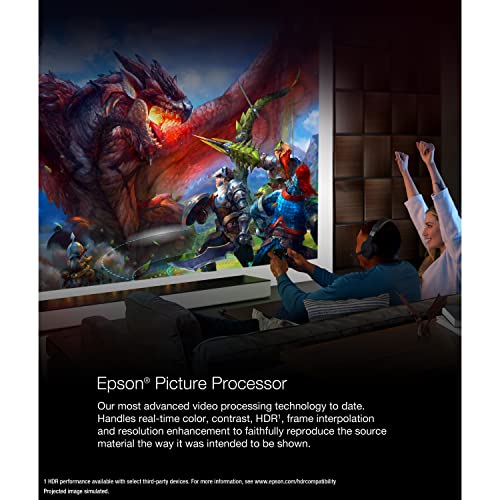Projectors are a great way to enjoy movies, presentations, and other media in high-definition. With the right projector, you can get a big-screen experience without spending a fortune.
Our guides of the top projectors will help you find the perfect one for your home theater or office. We’ve done the research and compared the specs, features, and prices of each model so you can make an informed decision.
Our Top Picks
-
Best Overall: Optoma UHD60
-
Best Portable: Anker Nebula Capsule 3
-
Best Home Theater: Epson Home Cinema 5050UB
-
Best Outdoor: ViewSonic PX706HD
-
Best Office: BenQ MW632ST
-
Best 4K: Sony VPL-VW885ES
-
Best Budget: AuKing M8-F
Buying Guide
Projectors have become increasingly popular for both personal and professional use, as they provide an immersive visual experience that can be enjoyed in the comfort of your own home or in a business setting.
However, with so many projectors on the market, it can be overwhelming to decide which one to buy. We'll discuss some of the key factors to consider when choosing the best projector for your needs.
1. Resolution
Resolution is one of the most important factors to consider when choosing a projector. It refers to the number of pixels that make up the image, and the higher the resolution, the sharper and more detailed the image will appear. Some of the most common resolutions for projectors include 720p, 1080p, and 4K.
While 720p is suitable for basic presentations or movie watching, 1080p is ideal for most applications, and 4K projectors offer the highest level of detail and clarity. However, keep in mind that higher resolution projectors are often more expensive.
2. Brightness
The brightness of a projector is measured in lumens and determines how well the image will be visible in various lighting conditions. For a home theater, a projector with 2,000-3,000 lumens should be sufficient, while a business or classroom setting may require a projector with 3,000-4,000 lumens or more.
Keep in mind that brighter projectors tend to be more expensive and can also produce more fan noise.
3. Contrast Ratio
The contrast ratio measures the difference between the brightest and darkest parts of the image, and a higher contrast ratio means a more vibrant and dynamic image. A contrast ratio of at least 1,000:1 is recommended for most applications, but higher-end projectors can offer contrast ratios of up to 50,000:1 or more.

4. Throw Distance
The throw distance refers to the distance between the projector and the screen, and it is important to choose a projector with a throw distance that fits your specific needs. A projector with a shorter throw distance is ideal for smaller rooms, while a longer throw distance is necessary for larger rooms or outdoor use.
5. Connectivity
Make sure to choose a projector that has the necessary connectivity options for your needs. For example, if you plan to connect your laptop or other devices to the projector, look for a projector with HDMI or VGA ports. Additionally, if you plan to use the projector wirelessly, look for a model with Bluetooth or Wi-Fi connectivity.
6. Lamp Life
The lamp life refers to the length of time the projector lamp is expected to last. Projectors with longer lamp life will require less frequent lamp replacements, which can be costly.
Look for a projector with a lamp life of at least 3,000-4,000 hours, but keep in mind that higher-end projectors can offer lamp life of up to 20,000 hours or more.
Frequently Asked Questions
1. What is a projector, and how does it work?
A projector is an electronic device that projects images or videos onto a surface such as a wall or projector screen. It works by using a light source, usually a lamp or LED, to project the image onto the surface through a lens.
2. What is the difference between a home theater projector and a business projector?
A home theater projector is designed for use in a home theater setup and is optimized for displaying movies and other video content in a dark room. Business projectors, on the other hand, are designed for use in bright, well-lit rooms and are optimized for displaying presentations and other business-related content.

3. What is the recommended distance between the projector and the screen?
The recommended distance between the projector and the screen, also known as the throw distance, depends on the projector's throw ratio and the desired screen size.
Most projectors have a throw ratio of between 1.2 and 2.0, which means that for every foot of screen width, the projector should be placed between 1.2 and 2.0 feet away from the screen.
4. Can I use a projector for gaming?
Yes, projectors can be used for gaming. However, you should choose a projector with a low input lag and a high refresh rate to ensure a smooth and responsive gaming experience.
5. Can I connect my smartphone or tablet to a projector?
Yes, many projectors have HDMI, VGA, or USB ports that allow you to connect your smartphone or tablet to the projector. Some projectors also have wireless connectivity options such as Wi-Fi or Bluetooth that allow you to connect your mobile device without a cable.
Final Thought
In conclusion, choosing the right projector involves considering several factors. By understanding these factors and how they relate to your specific needs, you can choose the best projector for your home theater or business setting.




